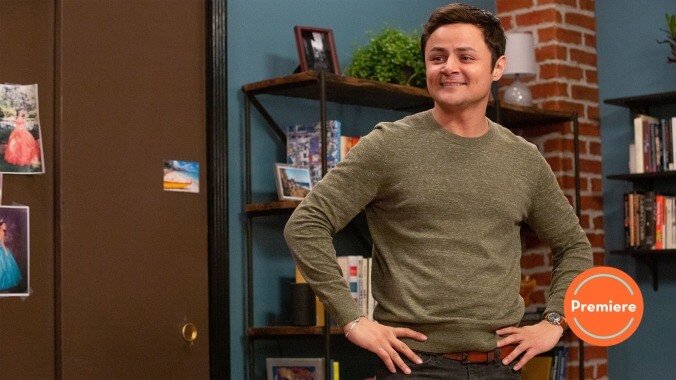Alternatino With Arturo Castro finds relatable moments in even the most specific types of humor

After stealing scenes in Broad City and commanding the screen in the third season of Narcos, Arturo Castro has found a starring vehicle—or twenty. The Guatemalan actor now heads up Alternatino With Arturo Castro, the Comedy Central sketch/variety show he adapted from his webseries of almost the same name. Castro is a charismatic performer and he lights up every sketch, whether he’s wearing prosthetics or portraying a (free-range) goose-stepping ICE agent. He proves he’s more than ready for the spotlight, shifting effortlessly from clueless dad to border patrolling bootlicker to starry-eyed thirtysomething in the city. Alternatino makes a great first impression, and it’s just getting warmed up.
The premiere is full of humor both topical and absurd: We see just how little help a roll of paper towels has to offer the hurricane-ravaged people of Puerto Rico—our fellow Americans—shortly before learning how one robot’s low self-esteem can thwart a cyber-uprising. The premises run the gamut from the universally relatable, like dreading small talk at parties, to the much more specific, like trying to figure out just how far you’re willing to play along with your date’s fetishization of Latinx machismo. But just as some late-night Comedy Central viewers may be growing uncomfortable with their love of salsa nights, Alternatino switches gears to mock the upwardly mobile, emotionally stagnant couples whose lives are made enviable but not more satisfying by the perfect home.
It’s that pullback, that skirting the edges of discomfort and discovery, that makes Alternatino such an enjoyable watch, one that will prove more challenging for some viewers than others. If you are not familiar with the panacea that is Vivaporú, some jokes—and points—will fly right over your head. You might find yourself like the middle-aged dad in the first sketch of the night, struggling to keep up with a conversation that becomes more expansive and inclusive by the minute. But although Castro has some fun at the expense of “Latin lover” chasers, the tone of the show is far from hectoring or mean-spirited. His comedy aims to upend stereotypes, but he’s also more than willing to turn that laser-sharp focus inward at his own hang-ups and shortcomings.
Castro examines his own foibles through strings of multi-act sketches—he plays a fictionalized version of himself, an actor-comedian type living in Brooklyn, born too late to claim the mantle of metrosexual. In the premiere, this recurring bit finds him trying to win over a white woman who almost throws her back out attempting to roll her r’s, which prompts Arrrrturrrrro to assure her she can just anglicize his first name rather than hurt herself trying to pronounce it. At first, there’s something rather jarring about having this kind of ongoing narrative running through the episode. It throws off the rhythm, because in order to keep this story-within-stories going, each sketch has to kind of peter out to allow room for more.
None of these individual acts is that funny (in the premiere, anyway), and they lead to payoff that’s more “hmm” than “ha!” But as the show progresses—yes, I cheated and watched ahead—these multi-act sketches grow funnier and more robust. They give the sketch series a bit of a sitcom feel; Arturo even has a group of friends played by Chris Triana and Chet Siegel who sit at his kitchen table and offer relationship advice. It’s an interesting gambit, as it allows Castro to indulge in a light Seinfeld romp without having to go full Mulaney.
But the biggest laughs and revelations are found in the one-off sketches, like when the show dons the guise of a farm-to-table commercial to criticize an official policy that treats migrant children like veal—sorry, free-range chickens. The imagery is decidedly discomfiting, yes, and for some, possibly too painful, but it’s always clear who is the butt of the joke. Castro’s spoken in interviews of the responsibility that came with his new platform, which he remains mindful of throughout. Future episodes broach similar territory, with one particularly silly bit about a planted provocateur coming in at the midseason point. The humor is often subtler but just as smart, such as when party guests inadvertently reduce the fictionalized Arturo to his ethnicity while trying to demonstrate their interest in world affairs.
Once again, we know who exactly who to deride, but Alternatino doesn’t deprive the oblivious of their humanity either—we see how well-meaning folks can bungle social interactions with people from marginalized groups, but they’re given a chance to learn from it. The prickliest of situations have nuance, as do the universally relatable ones. In a future episode, Arturo is recovering from a breakup, which is par for the comedy course. But he only bounces back with the help of his tías and their tamales. Here’s a premise that becomes no less universal for its specificity—not everyone will reflexively flinch over the chancla threat, but those who do will find that story more comforting without limiting the enjoyment of other viewers. Alternatino isn’t a sitcom, no matter how many running threads there are, but there’s goodness at its core.
Stray observations
- I picked up this review from someone else, which is why I was only going to watch the premiere for a drop-in, but then I ended up watching five more episodes. There is a riff on Make-A-Wish wishes that is just chef’s-finger-kiss perfection.
- The Guatemala tourism ad was a gas, in part because Latin American nationalism is a trip.
- I snorted when the projection of the menu was obscured by the robot’s tears. That’s how you prevent Skynet.
- When this recap was first posted, Chet Siegel was incorrectly identified as Sam Reece.